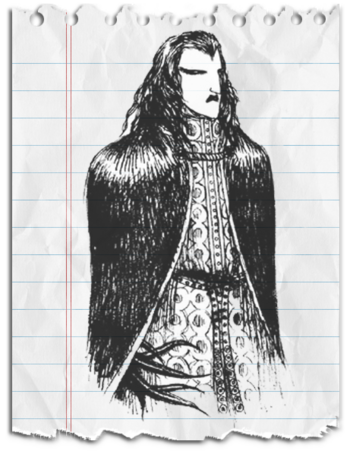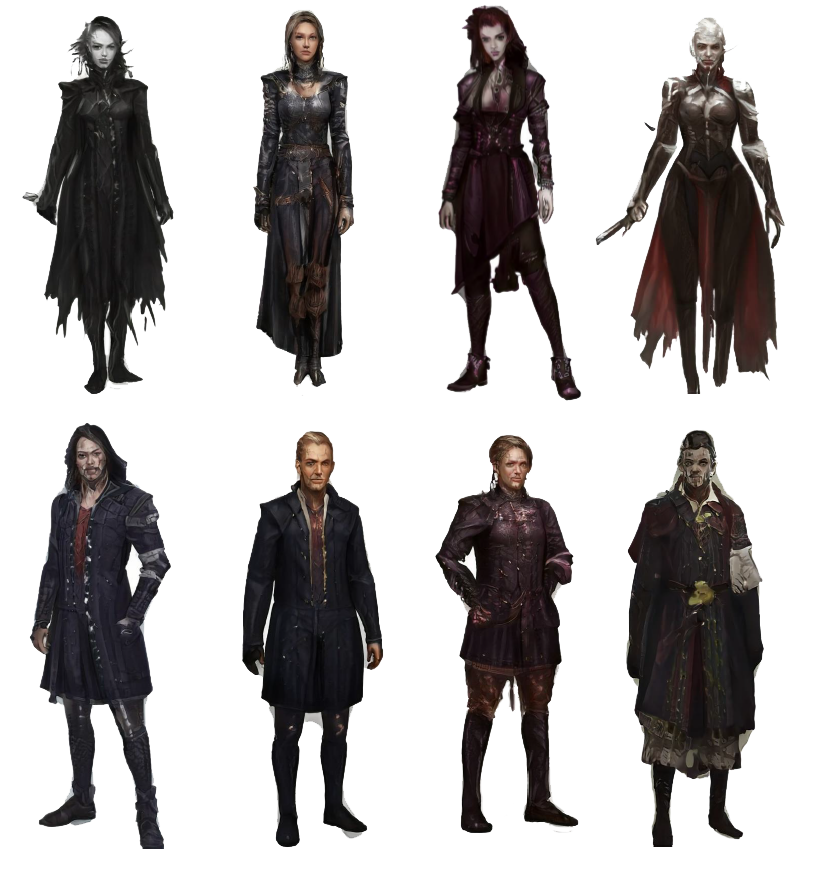Tzimisce
Jump to navigation Jump to search
WHO ARE THE TZIMISCE?
The Old Clan | Fiends | Dragons | Voivodes | Stokers
To the Tzimisce, possession is all. They aim to conquer and rule the subject of their possessiveness, jealously guarding it like their namesake dragon would its hoard. The clan’s charges have traditionally been defined geographically, such as a land or a regional people, and elder Tzimisce have reputations for being the shuddersome lord in the castle that looms above the crags. The young generations, though, have extended their obsessions to more liberal claims of possession: cults, companies, gangs, even military units. Their covetousness limited only by lack of expansive ambitions, they are exceedingly hard to dislodge once they’ve sunk their claws in.
To have been Embraced a Tzimisce means to own for the sake of owning, and to keep it out of the hands of others at all costs. In fact, many Tzimisce regard the Embrace itself as an act of ownership, and have decidedly traditional relationships with their childer, whom they may even regard as property in extreme cases. If pushed to the edge they’d rather burn with their charge than let it fall into the hands of others; as dragons, they are utterly familiar with the meaning of "scorched earth." Even tonight, they are the iron fist, with the velvet glove entirely optional. In a few cases their subjects are willing, but in most cases these subjects live in fear of an aloof master caring not about the happiness of its prize — only that it stays theirs. Visiting members of other clans are occasionally shocked to see Tzimisce domains that are run-down, neglected, or barren, until they remember that the Dragons don’t necessarily care whether their charges flourish, only that they are wholly owned. A decrepit tenement is just as likely to be a Tzimisce holding as an opulent estate on ancestral lands.
This relentless possessiveness extends as well to the physical form — and beyond — of the Tzimisce, who consider themselves the ultimate owners of their bodies, even beyond the limitations of the Curse of Caine itself. Many Dragons practice a specialization of the Protean Discipline known as Vicissitude that allows them to rework their bodies and those of subjects and even less willing victims. Indeed, those savvy to the lore of the clan recall the early nights of Vicissitude, when the Tzimisce refused to heed Protean limitations of wolf and bat forms, and pushed their mastery even further.
Even beyond the practice of physical Vicissitude, the Dragons are eager to extend that mastery into the realm of the mind and spirit. These Tzimisce practice a form of transcendentalism that concerns itself with the very limits of vampirism itself. They transform themselves into statues or ikons, or alter the traits of gender (such vestigial mortal trappings...), or cultivate retinues of lookalikes to subsume their own individuality. To hear the hoariest tales, some Voivode lords have themselves become one with their havens, or even suffused themselves into their homelands, merging their consciousness with the very soil of the domain. What better way to show ownership of the land and its folk than to become that very land and sustain the generations to come?
DISCIPLINES
Animalism: Some Tzimisce cultivate Animalism as an extension of their oneness with their domains. Others see it as a tool the better to command hosts of lesser beasts in order to claim those domains. In any case, Tzimisce have long felt an affinity with the more bestial denizens of their ancestral lands.
Dominate: The perfect Discipline for enforcing one's edicts through sheer mental force. Dominate not only helps the Dragons seize the object of their obsession, but also conditions long-term servitors into extensions of the Fiend's unquestionable will.
Protean: As masters of their own physical forms, the Tzimisce use Protean to force themselves into other shapes, especially those associated with many of the ancestral lands of the Old Clan, such as the bat and wolf. Beyond these traditional Kindred guises, many Tzimisce practice the methods of Vicissitude, which allows them to transcend the rote forms of Protean and treat their own bodies and those of their subjects as primal clay.
BANE
The Tzimisce are grounded: Each Tzimisce must choose a specific charge — a physical domain, a group of people, an organization, or even something more esoteric — but clearly defined and limited. The Kindred must spend their daysleep surrounded by their chosen charge. Historically this has often meant slumbering in the soil of their land, but it can also mean being surrounded by that which they tonight rule: a certain kind of people, a building deeply tied to their obsession, a local counterculture faction, or other, more outlandish elements. If they do not, they sustain aggravated Willpower damage equal to their Bane Severity upon waking the following night.
COMPULSION
Covetousness
When a Tzimisce suffers a Compulsion, the Kindred becomes obsessed with possessing something in the scene, desiring to add it to their proverbial hoard. This can be anything from an object to a piece of property to an actual person. Any action not taken toward this purpose incurs a two-dice penalty. The Compulsion persists until ownership is established (the Storyteller decides what constitutes ownership in the case of a non-object) or the object of desire becomes unattainable.
ARCHETYPES
Landlord
Since time immemorial, the Tzimisce have been the lords of their domains. In the modern nights, however, the lord on the mountain has all but vanished. The Tzimisce are a crafty clan, though, and though they may no longer be manorial lords in ancestral Old World estates, they find ways to exert control over urban domains and rural territories where they may. Landlords may own tenement slums or fashionable high-rises, but the result is the same: They bleed their tenants for their wealth just as they bleed their victims for their blood, and they consider both to be extensions of their property.
Gang Leader
It’s not a gang so much as it is a way to make sure everyone’s watching everyone else’s back when the rest of the world has written them off. The Gang Leader goes out of the way to show how everyone working toward a common goal that society tells them they can’t have simply needs to reach out and take it. If they weren’t running a drug cartel or a protection racket, the Gang Leader would be hailed as a captain of industry.
Grudgebearer
So long as the Tzimisce have claimed domain, they have been in conflict with those who seek to take it from them, which is often everyone to the covetous Fiends. In particular, the Tzimisce have longstanding hostilities toward the Tremere, Gangrel, and Nosferatu, whom they see variously not only as usurpers of the Blood but also as interlopers in territories that rightfully belonged to them or their sires. Grudgebearers rise each night to exact some small mote of cold revenge against those they perceive to have slighted them, and that guilt may well have transferred through a reviled lineage, leaving the Stoker to prosecute vendettas against the childer of childer of hated rivals.
Special Forces Commandant
Possessed not of a traditional land domain, the Special Forces Commandant has instead the nighfanatical respect of their unit, and their soldiers would follow them into Hell itself. So the Special Forces Commandant bides their time and trains their troops, for when they can perhaps parlay an insurrection or policing action into a greater claim of domain.
MUSIC FROM THE SUCCUBUS CLUB



